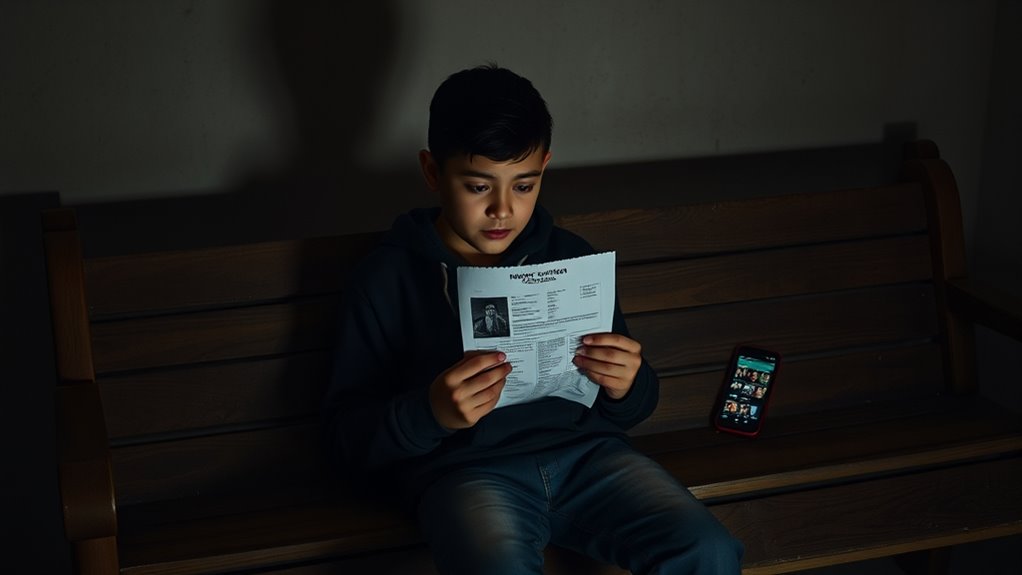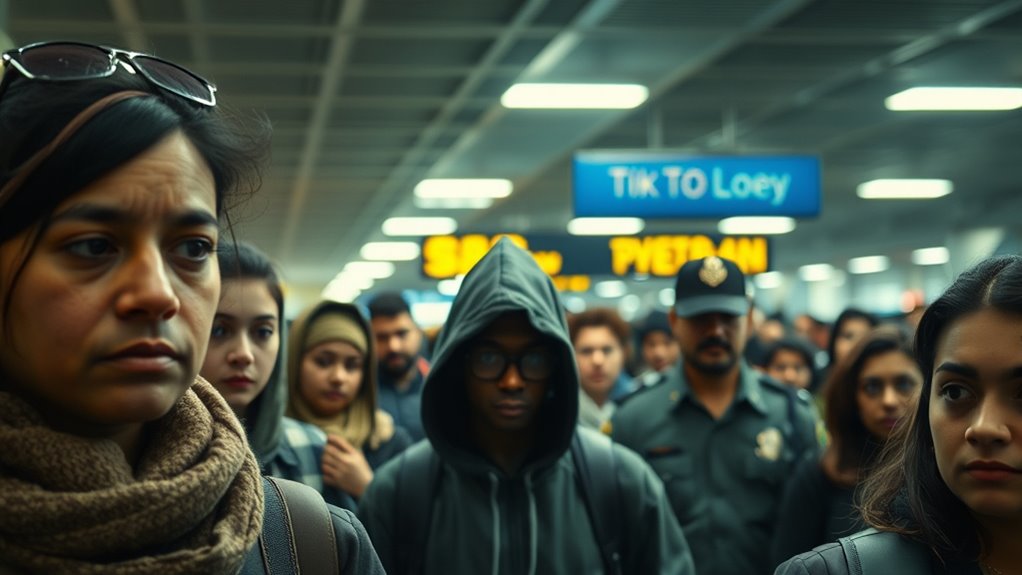On TikTok, you’ll see powerful personal stories that show how deportation affects real people’s lives. Creators share emotional experiences of family separation, fear, and resilience, making complex policies more relatable. Videos highlight systemic issues like legal document expiration and unfair detention. Activists rally support and push for reform, creating a sense of community. If you keep exploring, you’ll uncover deeper stories behind the headlines and better understand the human side of deportation.
Key Takeaways
- Personal stories on TikTok reveal the emotional toll of deportation on families and individuals.
- Creators use visuals and storytelling to make complex immigration issues relatable and impactful.
- Content highlights how legal document expiration and bureaucratic flaws increase deportation risks.
- Grassroots campaigns foster community support and advocacy for immigration reform.
- TikTok raises awareness by transforming policies into emotional, human-centered narratives that inspire activism.

TikTok has become a powerful platform for sharing compelling stories about deportation, giving viewers a raw and personal look at the human impact of immigration policies. As you scroll through videos, you’ll notice real people sharing their experiences—stories of fear, loss, resilience, and hope. These videos often feature individuals who have faced or are facing deportation, and they use their voices to shed light on a process that can seem distant or impersonal from the outside. You might see families torn apart, young people fighting to stay in their communities, or advocates pushing for reform. This raw honesty helps you understand that deportation isn’t just a political issue; it’s about human lives profoundly affected by policies often made without their voices.
In these TikToks, you’re encouraged to see beyond statistics and headlines. Creators use storytelling, visual effects, and emotional appeals to connect you directly with their struggles. For example, some share the emotional toll of being separated from loved ones, describing the heartbreak of saying goodbye or the fear of never seeing family members again. Others highlight the injustices they believe are embedded in the system, pointing out flaws like inadequate legal representation or arbitrary detention. Additionally, the stories often reveal how expiration of legal documents can impact a person’s ability to stay in the country. As you watch, you realize that these stories are not isolated incidents but part of a larger pattern affecting thousands of people. The platform allows them to voice their truths in ways that traditional media may not always capture.
You also notice the rise of grassroots activism on TikTok. Creators organize campaigns, share resources, and rally support for reform efforts. This gives you a sense of community and collective resilience, showing that even in the face of adversity, people are fighting back. TikTok’s format makes it easy for you to engage, comment, share, and learn more about the realities of deportation. It transforms a complex, often misunderstood policy issue into personal stories that tug at your emotions and challenge your perceptions. By witnessing these experiences firsthand, you become more aware of the human stories behind the headlines, and perhaps, more compelled to advocate for change.
Frequently Asked Questions
How Do Tiktok Creators Verify Their Deportation Stories?
You verify your deportation stories by sharing official documents, such as deportation notices or legal papers, and providing detailed personal accounts. You might also include video evidence or collaborate with trusted organizations to lend credibility. When you engage with your audience, you emphasize honesty and transparency, encouraging others to share their experiences authentically. This approach helps build trust and verifies your story amidst a sea of content.
Are There Legal Risks for Sharing Deportation Experiences on Tiktok?
Yes, sharing deportation experiences on TikTok can pose legal risks. You might inadvertently reveal sensitive or classified information that authorities could use against you or others. There’s also a chance of facing legal scrutiny if your posts contain false or misleading details, which could lead to investigations or legal action. To stay safe, avoid sharing specific personal details or anything that could be interpreted as illegal or compromising.
How Do Viewers Respond Emotionally to These Tiktok Videos?
You might notice viewers respond with a mix of empathy and distress when watching these TikTok videos. While some feel inspired by resilience, others experience sadness or anger over the harsh realities faced. The juxtaposition of hope and despair pulls at viewers’ emotions, making them reflect deeply. You see a spectrum of reactions, from tears to silent reflection, showing how powerful personal stories can evoke complex feelings on a platform built for connection.
What Impact Do These Videos Have on Public Policy Discussions?
You see these TikTok videos influence public policy discussions by raising awareness and sparking debate. They put personal stories into the spotlight, making complex issues more relatable and urgent. As viewers, you’re more likely to support reforms or advocate for change when you understand the emotional toll of deportation. These videos challenge policymakers to contemplate human perspectives, potentially leading to more compassionate and informed immigration laws.
Can Tiktok Documentaries Influence Immigration Law Changes?
Yes, TikTok documentaries can influence immigration law changes. When you watch and share these stories, you raise awareness and put pressure on policymakers. As public opinion shifts, lawmakers may feel compelled to reconsider existing laws or introduce reforms. Your engagement helps amplify the voices of those affected, making social issues more visible and potentially accelerating legislative action to address immigration challenges.
Conclusion
Seeing these deportation stories on TikTok reveals a side many don’t know. Imagine a young person sharing their fear as they’re pulled away from their family, with thousands watching and feeling helpless. These videos humanize what’s often just headlines, making you realize the real impact on lives. Next time you scroll, remember, behind every story is a person’s future—just like yours or someone you know. Awareness can spark change; don’t ignore these realities.









